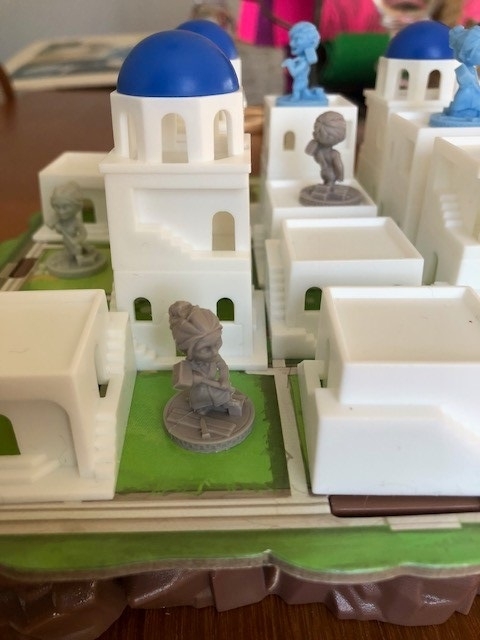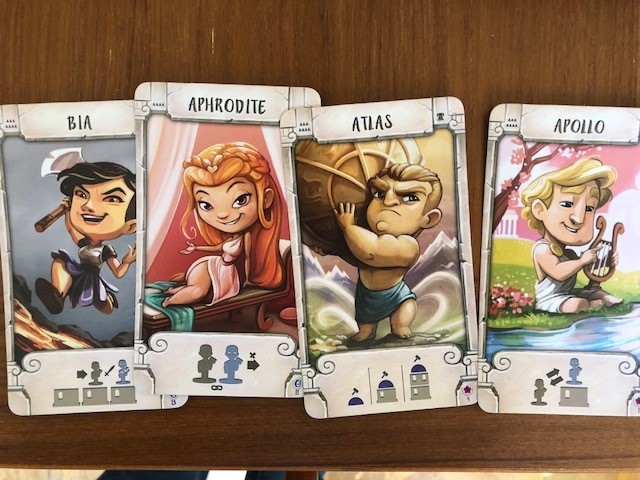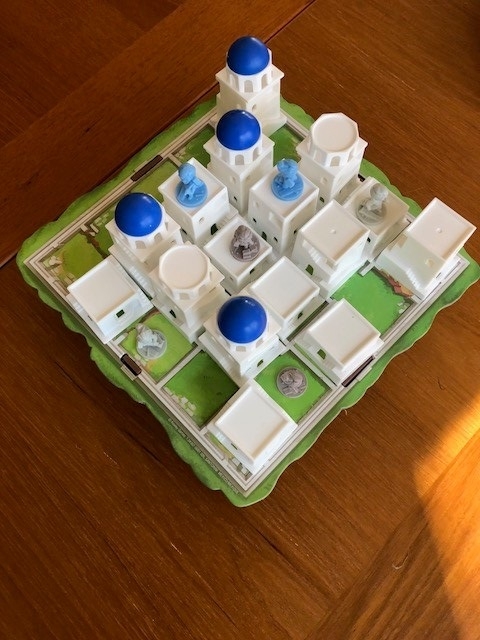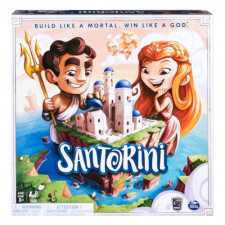Santorini Review
on Mar 7, 2018
Critical Hits: Elegant simplicity, the hallmark of an abstract game
Critical Misses: Divisive god abilities; great expansion to some, but unnecessary to others
Antoine de Saint-Exupery’s brother Chico, an avid gamer, once remarked that a game is great not when there’s nothing left to add, but when there are no other cities on the map after which to name it. Or something like that; the point is Santorini channels the spirit of the frères Exupery, delivering a sublime abstract experience akin to chess, go and other classics. And then throws in asymmetric god abilities to appease those who think bishops and rooks should have hit points and melee stats. But it still works.

This game has a handful of rules and one victory condition. Playing on a beautiful plastic model of the Greek island we’d all love to live on, even if it involved construction-based competition with neighbors, two players vie to be the first to ascend to the third level of a white-washed structure. Each turn involves moving one space, then building a level of iconic Hellenic edifice adjacent to your token. Players can’t ascend more than one level at a time, can erect blue domes atop a building’s third level to block movement, and that’s it. No spells, resource scarcity, or needing to explain away the nationalities of one’s helpers. Just pure strategy, abstracted to its peak. Santorini is the kind of game you can envision an octogenarian playing in Central Park against nine different opponents at the same time, shuffling back and forth through the falling leaves to call out moves and frustrate hipsters who just can’t seem to find an app for that.
Then, comes the bit of controversy. Not huge, Mage-Knight’s-not-actually-a-fantasy-adventure controversy or Scythe isn’t a 4X game controversy. This is the best kind, where players who want the god powers can include them, and players who don’t can skip them and still get maximum enjoyment. The alternate rules feature thirty different Greek gods, each one granting its avatar a game-breaking power, changing up the simplicity of Santorini to the joy or…meh of players. And this is a good thing. Just not a great thing, quantified by my half-star rating subtraction. Why not great? Because the powers aren’t perfectly asymmetrical.

Successfully combining the warm puppy of Euro-certainty with the wife’s raised-eyebrow questioning of the game state is an elusive target, and there are paradoxically two ways to hit its bullseye: either ignore randomness completely, like Santorini’s base game and nearly all the abstract classics do, or crank the rule-breaking to eleven, a la Rising Sun. Santorini’s pantheion (gotta include the “i†to stay Greek) cruises somewhat down the middle, including gods that the rules say should not be played against certain other gods because of their nemesis-like cancellation of each other’s abilities. Ironically, Nemesis, the Greek goddess of retributive justice, isn’t included in the game. Allá Egó ektrépo.
So this tweak sits at the periphery of one’s vision, like a tiny bit of chipped stucco catching the evening sun’s rays just before it recedes beyond the waves, causing your significant other’s small sigh as the wine glass is raised and reminding you that while you do live in paradise and this evening’s seafood dinner was exquisite, you were in fact near the paint store earlier today on your way back from the fishmonger’s.

Santorini almost perfectly walks the tightrope of being a new abstract classic while carrying an El Dorado’s worth of add-on baggage to satisfy the Michael Bay crowd, and if the gods had been perfectly unbalanced it would have silenced fans’ “Really, there’s something else we didn’t know about the Transformers?†skepticism. Oh, and it does include rules for three or four players, which is pretty much like remaking Clash of the Titans without a stop-motion owl. As the consumer world’s proven time and again, someone somewhere wants it. But that’s the beauty of Santorini: it’s all either necessary or easily left out. For purists like me, Santorini’s a spectacular mental challenge with a few extra cards for decoration. For others, the gods are the extra seasoning lacking in the base game. For all, it’s a good time.

 Customer Support
Customer Support  Subscribe
Subscribe 




 Account
Account  Wishlist
Wishlist 

